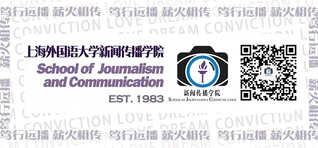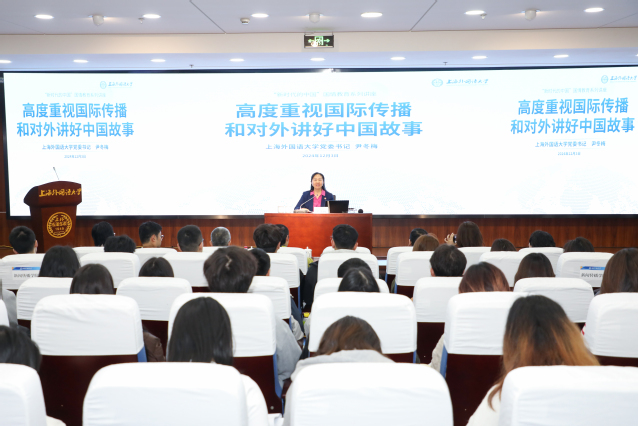
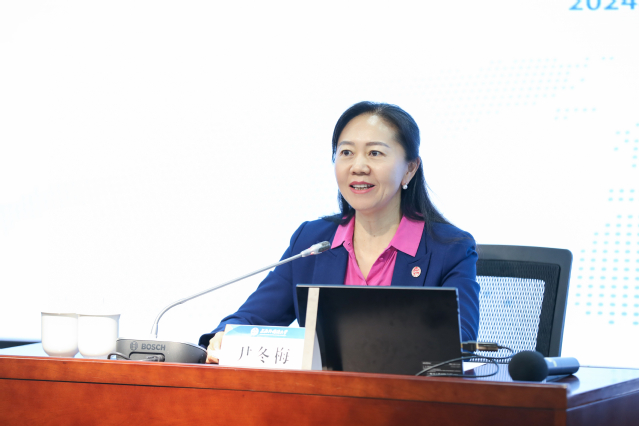
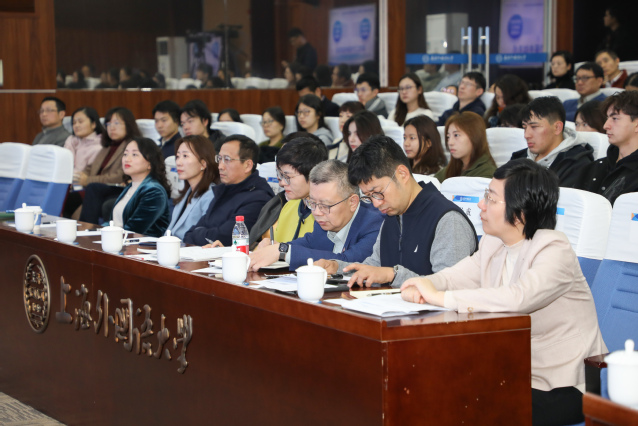
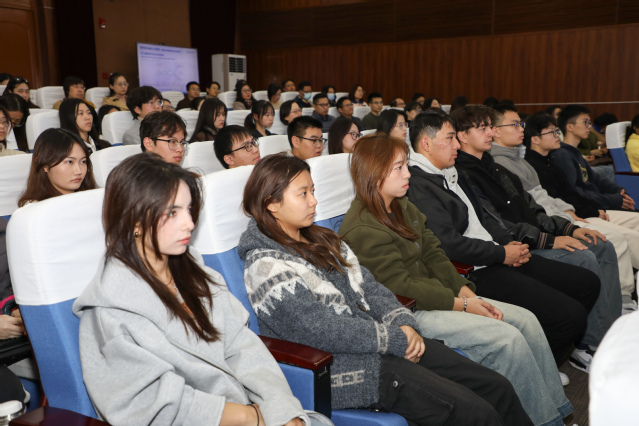
Written By: Lyu Yuhao, Wu Wenjing
Translated by: Guo Yishun
On the afternoon of December 3, the Shanghai International Studies University (SISU) hosted the final lecture of 2024 “China in the New Era” National Conditions Education Series at the International Educational Center. The lecture, titled “Prioritizing International Communication and Telling China’s Story,” was delivered by Yin Dongmei, Party Secretary of SISU. This marked the sixth and final session in the series, which attracted a broad audience of students, faculty, and media professionals.
The event was attended by over 5000 participants, both in person and online, from top universities in Shanghai, including Fudan University, Shanghai Jiao Tong University, and Tongji University, East China Normal University and Shanghai University, along with media representatives from outlets like People’s Daily, Xinhua News Agency, and Jiefang Daily. The lecture was hosted by Wu Ying, Dean of the SISU School of Journalism and Communication.
New Situation and New Mission: Placing High Importance on International Communication
Since the 18th National Congress of the Communist Party of China, the Central Committee with Xi Jinping at the core, has shown great foresight and a keen understanding of the times, attaching great importance to strengthening China’s international communication capabilities. President Xi has repeatedly emphasized the importance of international communication in his speeches and directives, introducing a series of new ideas, viewpoints, and conclusions.
In her lecture, Yin Dongmei reviewed key directives and initiatives from the Central Committee with Xi Jinping at the core in recent years regarding international communication. She traced the evolution of these policies, starting with President Xi’s proposal on August 19, 2013, to “tell China’s story well,” and culminating in the 20th CPC National Congress Report in October 2022, which further emphasized the importance of constructing a Chinese discourse system. These directives underscore the urgency of enhancing national soft power and international discourse power, providing clear guidance for building a more effective international communication system.
Currently, China is at a historical crossroads, with the great rejuvenation of the Chinese nation and the accelerating changes in the global landscape. In her lecture, Yin Dongmei analyzed the new challenges and opportunities in international communication, including changes in the international public opinion environment and the impact of new technologies like artificial intelligence (AI). “We are entering an era of AI,” she said, “new technologies are profoundly changing the landscape of international communication, and we must pay greater attention to the role of technological innovation, actively respond to the challenges these technologies bring, and improve our international communication capabilities in the AI age.”
New Opportunities and New Approaches: Building a More Effective International Communication System
During the lecture, Yin Dongmei discussed how China and Shanghai International Studies University (SISU) have explored practical ways to build a more effective international communication system. She emphasized that building a strategic communication system with distinctive Chinese characteristics is the core task of international communication in the new era.
“China needs to promote the spirit of patriotism and the spirit of reform and innovation, demonstrating the Chinese people’s values and aspirations, and integrating these into the core narrative of China’s international communication,” Yin said. She highlighted the importance of distilling China’s development path, such as its reform and opening-up policies, poverty alleviation efforts, and the Chinese path to modernization, into new concepts, new expressions and new discourse that are easily understood by the international community. “We should study the successes of these policies and their underlying reasons, forming a complete discourse system to explain China’s path to success to the world.”
Yin also shared SISU’s achievements in advancing international communication. The university has actively involved experts in translating key works like Xi Jinping: The Governance of China, and worked with the Memorial of the First National Congress of the CPC to translate 400,000 words of exhibition content into seven languages. SISU has also launched multilingual campaigns, including promoting The Communist Manifesto in multiple languages, and collaborated with the People’s Daily to produce multilingual promotional videos showcasing China’s national image.
New Era and New Responsibilities: Cultivating Talent for International Communication
“Ultimately, the competition in international communication comes down to competition for talent,” Yin emphasized. To support the ongoing development of international communication, it is essential to build a strong talent pool.
SISU has committed to nurturing “multilingual +” talent, focusing on language proficiency, international awareness, and expertise in specific fields. The university has created innovative teaching models that integrate multilingualism with international journalism, providing platforms for overseas practice and fostering students with a global perspective and cross-cultural communication skills.
Yin also discussed the need for strengthening research in international communication theory, emphasizing the importance of studying communication patterns that fit China’s national context. “We must pay more attention to the spillover effects of internal communication and the significance of precise external communication.”
In the interactive session, Yin engaged with students and faculty on various topics, such as how to leverage SISU’s multilingual and cross-cultural advantages to enhance international communication skills, reduce “cultural discount (the phenomenon where media products lose value or appeal when consumed in cultures different from their origin),” and showcase China’s unique cultural charm. Yin emphasized the importance of language learning, cultural respect, and the use of AI technology in improving communication skills.
This lecture was part of the China in the New Era National Conditions Education Series, which has been held annually since 2018. The series aims to deepen students’ understanding of China’s evolving role on the world stage and its growing influence in international affairs.

 |Hongkou Campus|550 Dalian Road (W), Shanghai 200083, China |Songjiang Campus|1550 Wenxiang Road, Shanghai 201620, China
|Hongkou Campus|550 Dalian Road (W), Shanghai 200083, China |Songjiang Campus|1550 Wenxiang Road, Shanghai 201620, China